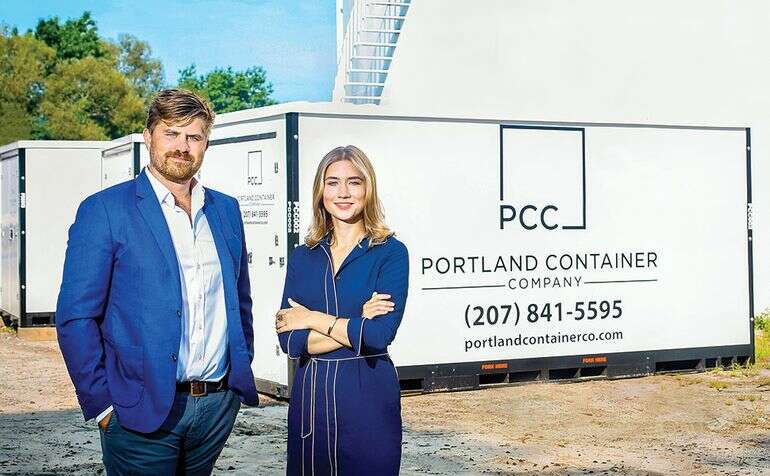
Growing market drives OpBox’s next round of scale-up funding
 Mike Tatro / Gamage Shipyard
Employees at Gamage Shipyard work on an awning and interior cabinetry for an OpBox.
Mike Tatro / Gamage Shipyard
Employees at Gamage Shipyard work on an awning and interior cabinetry for an OpBox.
OpBox, the startup maker of pop-up commercial “pods,” is attracting attention from buyers in Maine and beyond.
Now OpBox has its sights set on launching a Series A round of funding in the next couple of months, with the goal of raising $1 million and an eye toward a national launch of the product 12 months from now, said co-founder Ben Davis.
Financing to date includes seed funding and a Gorham Savings Bank loan; Davis declined to say how much has been invested so far. The business is close to being profitable, he added.
OpBox is the brainchild of sibling team Ben and Emily Davis. The two started a portable storage business called Portland Container Co. in 2017. They got the idea for OpBox from customers.
“Customers said, ‘I want to work in this. Can you put one in my backyard and I’ll make a shop out of it?’ That kind of thing,” Ben Davis, a Nobleboro native, recalled. “That rang some bells.”
The two put together five designs for commercial space and took them to Gamage Shipyard in South Bristol to perform interior finishes and systems fit-ups.
“Maine boatyards are uniquely qualified to build high-end, weather-resistant, technically advanced mobile structures,” according to the company’s website, which cites retail, hospitality, office trade, utility and kiosk use.
Two standard models are designed for use as retail spaces and sales kiosks. Three models are designed for hospitality and food spaces. The standard size is 8 feet wide by 16 feet long.

Three of the pods have been sold to customers in Texas, Davis said. Two of those units were fitted out for a school in Austin, one as a concession stand and one as a press stand for the school’s athletics stadium.
The company is also in the process of joining with a national retailer for a sales campaign, expected to start a year form now, he said, adding that he couldn’t discuss details at this time.
There are 12 OpBoxes in the production pipeline now and six on order, he said. Among the buyers are Portland Paddle, Maine Brew Bus and jewelry-maker Chart Metalworks. The first deployment was a “Play Kiosk” commissioned by the nonprofit Friends of Congress Square Park to offer board games and other recreational items for free public use in the open space at Portland's Congress Square.
The main difference between an OpBox and a shipping container that’s been built out, say, as a home, is that the shipping container becomes a fixed steel building that isn’t designed to move. OpBox is designed to be mobile, Davis said.
He continued, “We’re competing with food truck builders and pop-up spaces that are great products and are coming out of big factories that pump out thousands of these. Those are the number we want to get to, but we’re selling one box at a time right now.”
The average OpBox cost is $47,000.
“These are not inexpensive,” he said. “People want to know what they’re getting for that and what the quality is.”
As a result, marketing to date is done on an “experiential” basis, he said.
“We don’t sell via brochures,” he said. “We work individually with customers and show them what they’re getting. When they walk into the OpBox and see the details, it sells itself.”
Part of the brand, he added, is its link to Gamage Shipyard and the reputation of the Maine boatbuilding industry.
“There’s a lot of power in that reputation,” he said.
OpBoxes are currently being produced at a rate of one every three weeks.
“We want to get that down to every three days,” he said. “We’re past the first stage of testing the concept. Now we’re building the business. We’re working on simplifying the design process and making our production and manufacturing more efficient.”
True Course’s concierge-type hospitality services was a natural segue into a more scalable venture that still had customer interaction in a hospitality mindset, Davis told Mainebiz last October.










0 Comments